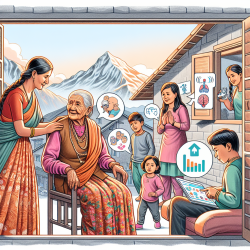Introduction
The role of family support in the health and well-being of older adults is a topic of growing importance, particularly in regions like Nepal where traditional family structures are evolving. A recent study titled The role of family support in the self-rated health of older adults in eastern Nepal: findings from a cross-sectional study sheds light on this crucial issue. As practitioners in the field of speech-language pathology, understanding these dynamics can enhance our approach to therapy and improve outcomes for our clients, particularly in settings where family involvement is integral.
Understanding the Research
The study conducted in eastern Nepal involved 844 older adults and explored the association between family support and self-rated health. The findings revealed that participants who received family assistance with activities of daily living had nearly four times higher odds of reporting good health compared to those without such support. This underscores the significant impact of family involvement in the daily lives of older adults.
Implications for Practitioners
For practitioners, these findings highlight the importance of incorporating family dynamics into therapeutic practices. Here are some actionable insights:
- Engage Families in Therapy: Encourage family members to participate in therapy sessions, either in person or virtually, to reinforce therapeutic goals and provide emotional support.
- Educate Families: Provide resources and training to family members on how they can support the older adult's health and well-being, including communication strategies and daily living activities.
- Advocate for Family-Based Policies: Support policies that recognize and facilitate family involvement in the care of older adults, such as tax benefits or subsidies for family caregivers.
Encouraging Further Research
While the study provides valuable insights, it also opens avenues for further research. Practitioners can contribute by:
- Exploring Cultural Nuances: Investigate how cultural beliefs and practices influence family support and health outcomes in different regions.
- Longitudinal Studies: Conduct long-term studies to assess the impact of family support on health outcomes over time.
- Interdisciplinary Collaboration: Work with researchers from sociology, gerontology, and public health to develop comprehensive models of care that integrate family support.
Conclusion
The findings from the study underscore the critical role of family support in the health of older adults in Nepal. As practitioners, integrating these insights into our practice can enhance therapeutic outcomes and contribute to the development of effective care models. For a deeper understanding, I encourage you to read the original research paper: The role of family support in the self-rated health of older adults in eastern Nepal: findings from a cross-sectional study.










